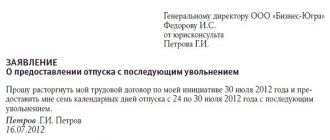From the article you will learn:
The current labor legislation establishes a strict list of disciplinary sanctions that can be applied to employees who have committed certain offenses. And if in some situations a careless employee can get away with a simple reprimand or reprimand, then in other circumstances failure to comply with labor discipline can have much more serious consequences. An employee who has an existing disciplinary punishment behind him has a much greater chance of being fired. Let's take a closer look at how many reprimands are needed to dismiss an employee under an article.
Through seeking to prosperity
Labor discipline is the key to a successful business.
This applies not only to achieving personal results, but also affects the prosperity of the company as a whole. Sloppy employees who are late for negotiations, look sloppy, let down counterparties and take it out on clients will not allow the implementation of even the most ideally verified plan by management. And good salaries, comfortable jobs and regular bonuses do not always motivate staff. More precisely, the carrot method is good, but not for the absolute majority.
https://www.youtube.com/watch?v=ytdevru
There are few people who work properly on their own, fulfilling plans and without causing any complaints. They are non-confrontational and neat. At the same time, not because of possible “goodies” from the company, but just the way they are designed. Perfectionists or neat freaks by nature.
Even larger is the group of those who are subject solely to the whip in the form of disciplinary sanctions. Only the threat of punishment motivates them, if not to professional achievements, then at least tolerable compliance with job descriptions and local regulations of the enterprise.
Some do not value their place so much that they violate the “rules of conduct” and fail to fulfill their duties over and over again, accumulating penalties. The bosses of such employees ask themselves: after how many reprimands can an employee be fired?
Reprimand, reprimand, dismissal: the main thing about disciplinary sanctions
Why are disciplinary sanctions necessary, why should they be imposed, and how to formalize the penalty correctly so as not to run into a fine yourself.
The legislator intended that a reprimand be more severe than a reprimand. But in reality this is a pure formality. After all, criteria for choosing one or another measure are not established anywhere.
Of course, something minor is usually reprimanded. But in one company it is insignificant to violate the dress code, while in another the same thing is classified by management as a serious deviation from the prescribed requirements.
As a rule, the first time is a reprimand, and then a reprimand. But no one obliges you to choose only one option ten or twenty times.
There is also no difference in consequences as such. After a year, both will be “neutralized.” And if you are punished a year after the first sanction was applied, then they will no longer be considered. There is no system in place, that is, dismissal for repeated repetition will not work.
Is it possible to fire someone for one reprimand?
How many reprimands are enough for dismissal? Before answering this question, let's figure out what penalties generally exist and why they are used.
Violations of official duties, requirements of regulations, instructions and orders are disciplinary offenses. An important point is that a person’s actions should not constitute a crime or administrative offense. After all, criminal liability is provided for crimes, and administrative liability is provided for administrative offenses.
Punishments for disciplinary offenses are provided for in the Labor Code of the Russian Federation. Today there are three types:
- comment;
- rebuke;
- dismissal.
A reprimand is an independent punishment and not a reason for dismissal. Of course, if we are not talking about a relapse.
It is strictly forbidden to invent or approve any other options. Labor relations are not a field of fantasy, unfortunately for many managers. We pay special attention to the fact that it is prohibited to develop a system of fines, calling them disciplinary sanctions.
We suggest you read: How to enter into an agreement with an energy supply organization directly
Inconsistency of the employee with the position held
Clause 3, part 1, art. 81 of the Labor Code of the Russian Federation provides for such grounds for dismissal of an employee as failure to pass certification to confirm compliance with the position held by him. The certification referred to in this paragraph should be distinguished from voluntary certification for obtaining a qualification category, which is carried out in accordance with Order of the Ministry of Health of Russia dated April 23, 2013 No. 240n “On the Procedure and timing of certification for medical workers and pharmaceutical workers to obtain a qualification category "
The employer has the right, on its own initiative, to assess the level of knowledge, skills and professional skills, experience of medical workers and their suitability for the position held. To do this, the medical organization must adopt its own regulations on the certification procedure and create a special certification commission.
The main criteria for certification are the volume and complexity of the employee’s work, the results achieved in the performance of official duties, the quality and degree of independence of the work performed, responsibility for the assigned work, and professionalism. Certification should not be reduced to simple testing, but must necessarily take into account the level of education, advanced training, experience, compliance with qualification requirements and professional standards. If a health worker fully complies with all educational requirements for his specialty, regularly improves his qualifications, and undergoes voluntary certification for assignment of a qualification category, then it will be extremely difficult to recognize him as inappropriate for his position based on the employer’s certification. The court may recognize such certification as illegal, and the doctor may be reinstated at work (see, for example, the decision of the Kirovsky District Court of Irkutsk, Irkutsk Region, dated November 9, 2018, in case No. 2-3807/2018).
Dismissal on this basis is allowed in the same way as in case of layoff, only if it is impossible to transfer the employee with his written consent to another job available to the employer (either to a vacant position or work corresponding to the employee’s qualifications, or to a vacant lower position or lower paid job), which an employee can perform taking into account his state of health (Part 3 of Article 81 of the Labor Code of the Russian Federation).
The employee is fired. What about organizations?
The article is devoted to the responsibility of employees, but it is worth saying a few words about the responsibility of the second party - the employer, who, in his thirst for fair punishment, may demand that a lawyer or personnel officer go beyond the boundaries of labor legislation. This is less common in budgetary institutions, but the management of private companies considers themselves less bound by legal norms. Wrong position.
So, let’s take a situation where the manager does not listen to the lawyer or personnel officer, but demands to apply a penalty not provided for by the Labor Code of the Russian Federation - a severe reprimand for the secretary who violated the deadline for sending the document. The deadline for sending was set in her job description, and the document was important, so the boss considered it possible to choose a more stringent measure of punishment. His position contradicts the Labor Code of the Russian Federation.
If it is not possible to convince of the illegality of such actions, then it should be borne in mind that the consequences will be negative. Firstly, any prohibited actions will be declared illegal and the order will be canceled, and the director or legal entity will be held accountable and pay a fine.
Let's go back to the example. A reprimand or reprimand could be applied to the secretary. We'll talk about how they differ a little later. Now let’s list other options for illegal disciplinary sanctions:
- change of position to a lower one;
- notorious fines;
- vacation cancellation;
- severe reprimand;
- assigning a negative rating;
- working overtime without pay;
- cancellation of earned time off.
Some even insist on making a corresponding entry in the work book. This is also prohibited unless we are talking about dismissal for appropriate reasons. Let us recall that dismissal is the most severe type of punishment in the field of labor relations, but it cannot be applied simply at will. All grounds are enshrined in the Labor Code of the Russian Federation, and the list is exhaustive.
Employers also make another mistake - they incorrectly answer the question of how many reprimands are needed to fire an employee. Mistakenly believing that a reprimand is so serious, then one time is enough to terminate the employment relationship. This is wrong.
Dismissal of health workers due to liquidation of the organization
Termination of the activities of a medical organization (individual entrepreneur) in which a medical worker is employed is an absolute basis for the dismissal of any employees, even those belonging to socially vulnerable categories (pregnant women, single mothers, etc.). It would seem that everything is simple, but in practice many controversial situations arise both regarding the procedure and the consequences of dismissal for doctors and nurses.
Firstly, it should be borne in mind that for dismissal on this basis it is not enough just a declarative statement from the manager to cease activities and close the clinic. It is necessary to adopt, in accordance with the procedure established by law, a decision of a medical organization to terminate activities and actual actual termination of activities (clause 28 of the Resolution of the Plenum of the Supreme Court of the Russian Federation dated March 17, 2004 No. 2 “On the application by the courts of the Russian Federation of the Labor Code of the Russian Federation”). Activities may also be terminated due to refusal to renew a license for medical activities.
In addition, in judicial practice, the position is expressed that this is not enough, but it is necessary to carry out all other actions related to the liquidation of the organization (appointing a liquidation commission, establishing the timing and procedure for liquidation, publishing a notice of liquidation in the media, notifying creditors of liquidation, making in the Unified State Register of Legal Entities, records about the legal entity being in the process of liquidation (Determination of the Second Cassation Court of General Jurisdiction dated May 26, 2020 in case No. 88-8163/2020).
Please note that it is impossible to dismiss on this basis if the rights and obligations of the organization are transferred to another person through succession, that is, it is unacceptable to “disguise” the reorganization as liquidation. But if only a branch or a separate unit in any locality closes, but the parent organization continues to work, then the dismissal should be carried out precisely in connection with the liquidation of the organization, and not as a result of the employee’s refusal to be transferred to another locality (Part 4 of Article 81 Labor Code of the Russian Federation; determination of the Supreme Court of the Russian Federation dated June 24, 2019 No. 83-KG19-4).
Before issuing a dismissal order in connection with the liquidation of a medical organization, its head is obliged to notify employees about this 2 months in advance (Part 2 of Article 180 of the Labor Code of the Russian Federation) and the employment service (Clause 2 of Article 25 of the Law of the Russian Federation dated April 19. 1991 No. 1032-1 “On employment”). At the same time, an industry agreement or a collective agreement may establish a different, longer period for notification. Advance notice of dismissal is necessary so that the health worker can resolve the issue of further employment during this time.
The Labor Code of the Russian Federation allows for early termination of an employment contract with the employee’s consent.
Upon dismissal, in addition to wages and vacation pay, the health worker must be paid severance pay in the amount of one average salary (Part 1 of Article 178 of the Labor Code of the Russian Federation), and if the employment contract is terminated early, then additional compensation in the amount of average earnings for the remaining period before the end of the period (Part 3 of Article 180 of the Labor Code of the Russian Federation). In exceptional cases, when the employment of a dismissed employee is delayed, the employer must pay him the average salary for the second and third months from the date of dismissal (Parts 2, 3 of Article 178 of the Labor Code of the Russian Federation).
Why impose penalties?
At first glance, it is not entirely clear why a penalty should be imposed at all. In itself, it just seems like an elaborate way to scold an employee. But in fact, two things can be done based on the foreclosure.
Withdraw premium
According to labor law, it is prohibited to fine employees - you can only recover money from them for causing damage to the employer’s property. But if an employee fails to cope with his job responsibilities, the bonus can be withdrawn from him - and the basis for this will be a disciplinary sanction.
It is possible to withdraw a bonus based on a penalty if the employment contract clearly states that the bonus is issued in the absence of penalties or in full compliance with labor discipline. In this case, a remark or reprimand will allow the bonus to be officially withdrawn, and the employee will not be able to challenge it.
Disciplinary sanctions are imposed for violation of labor discipline. The concept itself sounds abstract, so let’s look at what it includes.
- Failure to fulfill labor duties. The employee does not fulfill what is specified in his employment contract and job description. For example, a sales assistant does not advise people on the sales floor.
- Failure to follow orders from superiors. The boss gave the employee a task within his scope of responsibilities, but the employee did nothing.
- Late. Individual lateness is usually reprimanded, and systematic lateness is reprimanded. A reprimand may also be issued if the delay had a significant impact on the work process, for example, equipment was idle due to the fact that its installer did not arrive on time.
- Absenteeism. Here everything is like being late - you can assign a reprimand or a reprimand, depending on the consequences of absenteeism.
- Violation of safety rules. The employee did not attend safety training or violates safety procedures in the workplace.
- Embezzlement, theft, damage to equipment. Any actions that cause material damage to the organization. This can range from the banal theft of consumables to the transfer of confidential information to competitors.
- Other violations of labor discipline. Fights in the workplace, insulting colleagues and superiors, being drunk at work - this includes everything that in one way or another interferes with the work process.
We suggest you read: Is it possible to find out a court decision without a case number?
It is important that everything is in accordance with the employment contract and job description. For example, if you asked a sales consultant to lay out goods in a warehouse and he broke the forklift, you cannot assign a penalty for this - the sales consultant is not required to lay out anything or understand forklifts at all. Or if an employee works remotely and does not have a set work schedule, he cannot be punished for being late.
For the same offense, two disciplinary sanctions cannot be imposed - for example, a reprimand and dismissal. You only need to do one thing. But it is possible to assign financial liability or remove a bonus, since these punishments are not disciplinary sanctions.
Algorithm of actions
In order for the dismissal of an offending employee to be legal, and for the manager to not be held accountable for his actions in court, the entire algorithm of this procedure must be followed.
The correct way to apply dismissal as a disciplinary sanction is as follows:
- An employee who notices a disciplinary offense must report it to senior management in writing;
- Senior management, in turn, must: Make all necessary efforts to ensure that this misconduct by a particular employee does not happen again;
- Demand an explanatory statement in writing from the offending employee;
The employer also needs to remember within what time frame the dismissal of an employee for violation of labor discipline is considered legal:
- One month. The period is counted from the day the misconduct was discovered, with the exception of those days when the employee was on vacation or sick leave;
- Six months. The period is counted from the day the offense was committed and can be extended to 2 years if the violation was discovered during the inspection.
Provided that during the year the citizen has no more disciplinary sanctions or repeated violations, the first punishment is automatically cancelled. And we can assume that the person has no disciplinary sanctions.
Fines are prohibited
Fines are not a term from labor law. Although many employers require personnel officers and lawyers to develop a system of fines at the enterprise. Forbidden. Therefore, if appealed, the measure will be canceled.
A fine can be collected from a responsible person who has violated, say, fire safety regulations, only by a representative of the supervisory authority, but not by the company administration.
Or a certain full-time ecologist is obliged to register with the state objects that have a negative impact on the environment, but he did not do this. He was duly brought to administrative responsibility. At the next inspection, it turned out that the ecologist had not done anything - he was fined again.
The procedure for imposing a penalty
To properly impose a disciplinary sanction, you need to complete several documents in order.
In it we write in free form what exactly the employee violated, how it was discovered and what impact it had on the work process. The act must be signed by three people: usually the person who discovered the violation, the employee’s supervisor and another witness. Supporting documents should be attached to the report - recordings from surveillance cameras, time sheets, safety instructions, etc.
What and how to choose
So, by what criteria and who chooses the type of recovery? In practice, everything depends on staffing levels. If there is a personnel officer, then he makes the initial choice, setting out his position in the draft of the relevant order. More often than not, this project is coordinated with a lawyer. But it happens that it is not the personnel officer, but the lawyer who is developing drafts of such orders. If there are none, then the decision is entirely up to the director.
In any case, all circumstances must be taken into account, as well as the explanations of the participants and witnesses of the incident, the characteristics of the person, his attitude to the performance of his duties before this episode, as well as the proportionality of the proposed disciplinary measures.
How long does the penalty last?
Penalty can be applied no later than a month after the violation is discovered and no later than six months after the commission of the offense. According to Art. 194 of the Labor Code of the Russian Federation, the penalty is canceled automatically after a year or ahead of schedule based on the order of the employer.
We invite you to familiarize yourself with: The right of lifelong inheritable ownership of land plots
This means that an employee can be dismissed on the basis of a penalty only if he commits a second offense within a year after the first.
To initiate an order to lift a penalty, a request must come from the employee himself, the head of the department or the head of the enterprise. In this case, the personnel service issues a special order.
Dismissal for repeated violation of labor discipline
The answer to the question of how many disciplinary sanctions an employee can be dismissed after is reflected in clause 5 of Part 1 of Art. 81 Labor Code of the Russian Federation.
Dismissal for violation of labor discipline can be carried out if any penalty was previously imposed on the employee in the manner prescribed by law, and it was not lifted, or its one-year validity period has not expired, due to the requirements of Art. 194 Labor Code of the Russian Federation.
It is permissible to dismiss for any type of newly committed misconduct, in particular for:
- any gross violation, the list of which is given above in the article;
- being late, regardless of how much time has passed since the start of the working day;
- violation of the requirements of local acts, collective agreements, employment contracts.
It is important to note that when dismissing, its procedure must be followed, otherwise it may be declared illegal in court.
***
Thus, dismissal for violation of labor discipline can be carried out both in case of a single or repeated violation of labor discipline, but in all cases it must be formalized in accordance with the requirements of the law.
Exception to the rule
Labor law standards are codified, but are not limited to just one source. Especially when it comes to the legal regulation of the work of individual subjects - police officers, prosecutors or judges. For them the responsibility is different.
For example, for employees of the internal affairs system, Federal Law 342 of November 30, 2011 provides for a wider choice of punishment options, including a severe reprimand.
Let us recall that the previously effective Labor Code contained not three, but four options for disciplinary sanctions (Article 135 of the Labor Code of the Russian Federation) for all categories of workers. The reprimand had two “degrees”: ordinary and strict.
NTVP "Kedr - Consultant"
LLC "NTVP "Kedr - Consultant" » Services » Legal consultations » Labor disputes » How many times can an employee be reprimanded before dismissal?
Question:
How many times can an employee be reprimanded before dismissal?
Lawyer's answer
A disciplinary sanction is a type of liability that is applied to an employee if he has not performed or improperly performed his job duties.
Types of disciplinary sanctions - reprimand, reprimand and dismissal for special reasons. Other types of penalties for commercial sector organizations, as a rule, are not applied. Exceptions are possible in very rare cases for specific organizations, when the application of another type of penalty is directly provided for by federal law, charters and regulations on discipline (Parts 1, 2 of Article 192 of the Labor Code of the Russian Federation).
The disciplinary sanction “put on sight” is not provided for either by the Labor Code of the Russian Federation, or by federal laws, or by charters and regulations on discipline for certain categories of workers. Therefore, the use of this type of penalty is not allowed (Part 4 of Article 192 of the Labor Code of the Russian Federation).
Ready-made solution: What types of disciplinary sanctions can be applied by an employer to an employee (ConsultantPlus, 2019) {ConsultantPlus}
Before reprimanding an employee, make sure there are grounds for this. To reprimand an employee, take into account the special procedure for bringing to disciplinary liability.
Ready-made solution: What types of disciplinary sanctions can be applied by an employer to an employee (ConsultantPlus, 2019) {ConsultantPlus}
The basis for a reprimand is a disciplinary offense by the employee (clause 2, part 1, article 192 of the Labor Code of the Russian Federation). However, to issue a reprimand, we advise you to thoroughly assess how serious the offense is.
For example, if an employee performs his duties well, but committed a minor offense (for example, he submitted a report late and this did not lead to adverse consequences for you), in our opinion, there is no need to issue a reprimand. The court may consider such a penalty to be inconsistent with the employee’s misconduct. If the employee does not fulfill this duty systematically, a reprimand can be issued.
Ready-made solution: What types of disciplinary sanctions can be applied by an employer to an employee (ConsultantPlus, 2019) {ConsultantPlus}
To correctly issue a reprimand, proceed as follows:
1) record the offense, for example, in an act or report;
2) check whether the duty that the employee violated is documented. For example, if the obligation is enshrined in a local regulatory act, make sure that the employee is familiar with it by signature, taking into account Part 2 of Art. 22 Labor Code of the Russian Federation. Otherwise, you will not prove in court (in case of a dispute) that the employee knew about his duty and, despite this, violated it;
3) request a written explanation from the employee. If he does not provide such an explanation after two working days, draw up a report about this (Part 1 of Article 193 of the Labor Code of the Russian Federation);
4) issue an order to reprimand the employee and familiarize the employee with the order against signature within three working days from the date of its publication (not counting the time the employee is absent from work). If the employee refuses to familiarize himself, draw up a report (Part 6 of Article 193 of the Labor Code of the Russian Federation).
A reprimand can be issued, as a rule, within one month from the date of discovery of the offense (Part 3 of Article 193 of the Labor Code of the Russian Federation).
Ready-made solution: What types of disciplinary sanctions can be applied by an employer to an employee (ConsultantPlus, 2019) {ConsultantPlus}
Issue a reprimand by order (Part 6 of Article 193 of the Labor Code of the Russian Federation). Compose it in any form, since there is no normatively established one.
Familiarize the employee with the order against signature within three working days from the date of its publication (not counting the time the employee is absent from work). If the employee refuses to familiarize himself, draw up a report (Part 6 of Article 193 of the Labor Code of the Russian Federation).
Ready-made solution: What types of disciplinary sanctions can be applied by an employer to an employee (ConsultantPlus, 2019) {ConsultantPlus}
You can dismiss an employee if they repeatedly violate labor discipline (if the employee has a reprimand) if the following conditions are met:
1) such reprimand has not been withdrawn or extinguished;
2) the employee continues to violate discipline and you have grounds to bring him to justice again in the form of dismissal under clause 5 of part 1 of art. 81 of the Labor Code of the Russian Federation (for repeated failure to fulfill labor duties).
Such conclusions follow from clause 5, part 1, art. 81 Labor Code of the Russian Federation, para. 1, 2 clause 33 of the Resolution of the Plenum of the Supreme Court of the Russian Federation dated March 17, 2004 No. 2.
But before dismissal, take into account the general requirements for the procedure for bringing to responsibility. Be sure to take into account, in particular, the severity of the offense (Part 5 of Article 192 of the Labor Code of the Russian Federation).
Ready-made solution: What types of disciplinary sanctions can be applied by an employer to an employee (ConsultantPlus, 2019) {ConsultantPlus}
The explanation was given by Igor Borisovich Makshakov, legal consultant of LLC NTVP Kedr-Consultant, February 2018.
When preparing the answer, SPS ConsultantPlus was used.
What to remember
- There are only three types of penalties: reprimand, reprimand and dismissal.
- Based on the penalty, you can withdraw the bonus or dismiss the employee. It is impossible to issue a fine on the basis of a penalty - fines for disciplinary offenses are generally prohibited; they can be imposed only if the organization has suffered material damage.
- Penalties can be imposed for violation of labor discipline: absenteeism, failure to comply with work duties, theft and other offenses that interfere with the work of the company.
- To impose a penalty, you need to prepare five documents in order: an act of violation, a request for an explanatory note, the explanatory note itself (written by the employee), an order for the penalty, and an act of familiarization with the order.
- The penalty is valid for a year after issuance, it can be removed early.
Legal and illegal dismissal
Disciplinary action in the form of dismissal is quite a serious step for the head of an organization. Therefore, in order to do everything legally, it is necessary to comply with the norms and rules of the law.
The following mistakes are made quite often:
- Those documents that entail subsequent dismissal are missing or incorrectly drawn up;
- Application of punishment during the period when the employee is on vacation or sick;
- The employer fails to issue a work book on time;
- The employer violates all established deadlines when disciplinary action may be taken;
- Upon dismissal, all statutory payments and compensations are absent;
- The initial reprimand was imposed informally, meaning there was no written order imposing the punishment;
- The employee was fired for violating labor discipline, despite having a documented good reason;
- Applying two different penalties to one employee for one violation.
Therefore, in order to fire an employee for committing an offense in the workplace, mere desire and the presence of vague evidence are not enough. Clear evidence is needed.
If the employee was fired with the above errors, then such an action may be declared illegal in court.
In this case, a fine may be imposed on the employer, and compensation may be paid to the employee and he may be reinstated in his job.








